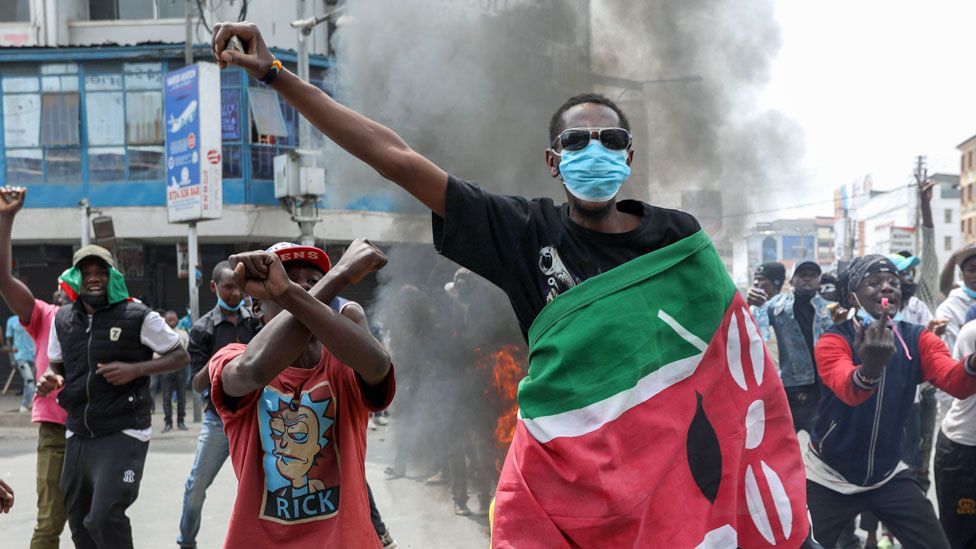Editorial
Learning From Kenya’s Protests

In an effort to consolidate the fiscal framework and strengthen Kenya’s economy, President William Ruto introduced a controversial bill laden with punitive taxes. This bill targets essential commodities, inflating the cost of living through increased fuel prices, imposing additional duties on exports, and controversially taxing sanitary pads, a move that is antithetical to gender equity. This legislative measure, intended as an economic panacea, instead thrusts the dagger deeper into the vitals of an economy already reeling from decadent living standards and systemic inequality.
The incremental taxes included in the bill are in line with Keynesian economic principles, where government intervention is required to regulate economic activity. However, such intervention is intended to be facilitative, not oppressive. In the case of Kenya, the controversial taxes would have reverberated through the socioeconomic strata, exacerbating unemployment, increasing inflation, and squeezing the already meagre incomes of the working class.
In the face of these oppressive measures, the streets have become a place where Kenyans are strongly protesting against the oppressive actions of the government. The youth, who represent the future of the country, are passionately exercising their democratic right to protest against the injustice they face. This is not just a reaction to economic troubles, but a powerful statement of their fundamental right to live with dignity and free from poverty.
Following weeks of peaceful demonstrations against the proposed legislation, protesters rampaged through the parliament in Nairobi. Subsequently, Ruto authorised the deployment of both police and military forces to suppress the unrest. Regrettably, it has been reported that 13 protesters were killed and many others injured by the police. Such excessive force against civilians is completely unjustifiable. Rather than engaging in finger-pointing, the security officials responsible should face appropriate sanctions.
In 2022, the Ruto’s administration emerged victorious in the general elections in Kenya, coming into power with a commitment to enhance the living standards of the underprivileged and improve the overall conditions of millions of citizens. Notwithstanding the initial promises made during the election campaigns, the government faced the stark challenges of limited financial resources, considerable debts, and the consequent inability to promptly execute its promised agenda.
Undoubtedly, the sombre economic conditions compelled the government to implement the financial bill last year, introducing a housing tax and elevating the top personal income tax rate. This action incited dissatisfaction among substantial portions of the population, leading to public displays of outrage, street demonstrations, and in some cases, legal challenges against the government’s policies.
This bill that caused a lot of public demonstrations and unrest may suggest that Kenya’s political system is not properly representing and including all groups in society. This also raises questions about the role of parliament in making sure proposed laws are thoroughly discussed and debated, to prevent protests from turning violent. However, attacking the seat of legislative power does not help the cause of protestations. Instead, it undermines the very structures that allow people to participate in the political process and seek change.
Despite the withdrawal of the bill by Ruto and his accusation towards security forces for inaccurate intelligence, the protests have continued without pause. This situation highlights the lack of genuine democratic principles in Africa. The crisis is primarily related to the economy, as the government, with a GDP of $113.4 billion and a population of 54.03 million, has acknowledged being in debt and facing financial constraints. To address its $78 billion debt, the government contemplated raising taxes.
The government said the country would have a $31.1 billion budget deficit if it cancelled the planned tax increase. This is made worse by the International Monetary Fund’s (IMF) recommendation that the country should expand the number of people and businesses that pay taxes; improve how well people and businesses pay their taxes and have a stricter financial policy to reduce the country’s debt problems. Similar to numerous African nations, Kenya is closely connected to the IMF.
Regrettably, many African leaders exhibit poor management of their nation’s economies, resulting in appalling hardships for the populace. The citizens are left to bear the consequences of their irresponsible handling of both domestic and international loans. It is necessary that African citizens exercise their voting power to remove ineffective and incompetent governments from office.
Nigeria has faced challenges due to past IMF advisories, like the Structural Adjustment Programme (SAP) in the 1990s. The actions taken based on IMF recommendations, such as removal of petrol subsidy and floating of the naira, have harmed the economy and led to negative impacts like job losses and poverty. African leaders should give priority to implementing locally-developed policies to drive economic growth rather than relying on external financial agencies like the IMF and World Bank.
Regardless of President Ruto’s concession, some protesters still insist on continuing demonstrations until the government collapses. This would be unwise as it could lead to a disproportionate use of force, escalating tensions and potential fatalities. Protesters should avoid creating conditions for anti-democratic forces to disrupt the democratic system that allows citizens to peacefully demonstrate. In a democratic society, political change can be sought through the ballot box in the next elections.
Editorial
Resolve Rumuwoji Market Issues, Others

Editorial
As NDG Ends Season 2

Editorial
Beginning A New Dawn At RSNC

-

 News4 days ago
News4 days agoAmend Constitution To Accommodate State Police, Tinubu Tells Senators
-

 Politics4 days ago
Politics4 days agoSenate Urges Tinubu To Sack CAC Boss
-
Business4 days ago
Crisis Response: EU-project Delivers New Vet. Clinic To Katsina Govt.
-
Business4 days ago
President Tinubu Approves Extension Ban On Raw Shea Nut Export
-

 News4 days ago
News4 days agoDisu Takes Over As New IGP …Declares Total War On Corruption, Impunity
-
Business4 days ago
Fidelity Bank To Empower Women With Sustainable Entrepreneurship Skills, HAP2.0
-
Business4 days ago
President Tinubu Extends Raw Shea Nuts Export Ban To 2027
-
Sports4 days ago
NDG: Rivers Coach Appeal To NDDC In Talent Discovery

